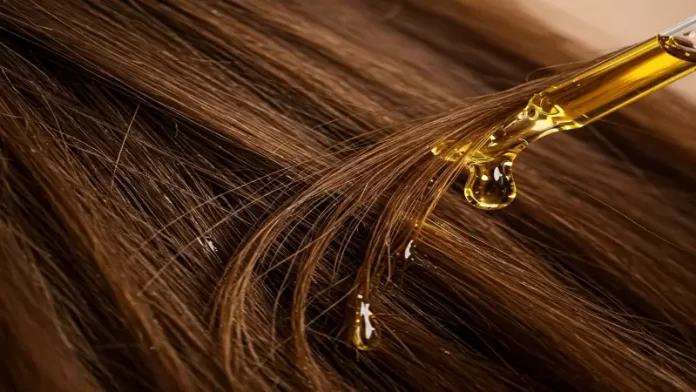Ah, hair oiling. It’s somethin’ many of us grew up with, a ritual passed down through generations, particularly in places like India. Your nani or dadi likely insisted on a champi (head massage) with warm oil, swearin’ it was the secret to strong, shiny locks. And you know what? They weren’t wrong! Oiling can be an absolute game-changer for your hair health. But like anything in life, there’s nuances, ain’t there? It ain’t just about slapping some oil on and hoping for the best. There’s a bit of an art to it, some science, and hey, maybe even a touch of cosmic timing if you’re into that sort of thing.
We’re gonna dive deep into the oily goodness, exploring why people do it, the best ways to do it, and even address some common myths and concerns. Ever wondered if oiling overnight is really all its cracked up to be? Or if there are times you shouldn’t be reaching for that bottle? What about using oil every single day – good idea or a recipe for disaster? Stick around, ’cause we’re about to unravel it all.
Table of Contents
Astrology and the Best Days to Oil Hair: A Cosmic Connection?
Now, this is where things get a bit, shall we say, celestial. For centuries, various cultures, includin’ Vedic traditions, have linked mundane activities like hair cutting or oiling to astrological timings. The idea is that planetary positions and lunar cycles can influence energy, and performin’ certain tasks during auspicious times can enhance their benefits. So, when people talk about the best days to oil hair astrology, they’re often referring to specific tithis (lunar days) or nakshatras (lunar constellations) believed to be favorable for hair and scalp health.

Some systems suggest Tuesdays and Saturdays might be less ideal for certain hair practices due to planetary influences (Mars and Saturn, respectively, sometimes associated with dryness or slower growth, depends on the specific school of thought). Conversely, days ruled by beneficial planets or specific nakshatras might be recommended. It’s fascinating, really, thinking that the moon’s phase might somehow impact how well your hair absorbs nutrients.
Is there scientific proof of this? Not exactly in a Western lab sense. But for many, it’s a deeply ingrained belief, a way of connecting with nature’s rhythms, and if it adds a layer of intention and ritual to your self-care, where’s the harm in explorin’ it? Just remember, if you miss an “auspicious” day, your hair isn’t suddenly doomed! Consistency and proper technique usually trump astrological timings in the practical world of hair care.
The Nitty-Gritty: Disadvantages of Applying Oil to Hair
Okay, let’s pump the brakes for a sec. While hair oiling offers a plethora of benefits, it’s not without potential drawbacks, especially if not done correctly. Knowing the disadvantages of applying oil to hair helps you avoid common pitfalls.
Firstly, overuse or improper washing can lead to product buildup. This residue can clog hair follicles, potentially leading to scalp irritation, itchiness, and even hindering healthy growth over time. Ever felt your hair feel heavy and greasy even after washin’? That’s likely buildup.
Secondly, oil can attract dirt and pollution. If you apply a heavy oil and then spend time in a dusty or polluted environment, those particles can stick to the oil, sitting on your scalp and hair until the next wash. Not exactly ideal for scalp hygiene, is it?
Thirdly, for people with already oily scalps, adding more oil can exacerbate the problem, leading to greasiness and potentially breakouts along the hairline or on the back. It’s about balance, know what I mean? Someone with a dry scalp will benefit differently than someone with an oily one.
Lastly, using the wrong type of oil can be a disadvantage. Some oils are too heavy for fine hair, weighing it down and making it look limp. Others might not agree with your specific scalp type, perhaps causing irritation or allergic reactions. Patch testing new oils is always a smart move, something many people forget.
How Long’s Enough? Minimum Time to Keep Oil in Hair
So you’ve applied the oil, massaged it in – now what? How long does it need to sit there to work its magic? While some people swear by overnight treatments, you don’t necessarily need to commit to eight hours of oily hair to see benefits. Understanding the minimum time to keep oil in hair is key for those shorter windows.

Honestly, even 30 minutes can make a difference. During this time, the oil has a chance to penetrate the hair shaft (especially oils like coconut oil, which have smaller molecules) and provide moisture. It also gives you ample time for a good scalp massage, which in itself stimulates blood circulation – a bonus for hair growth.
If you have an hour or two, even better. This allows deeper penetration and conditioning. The goal isn’t necessarily maximum absorption over endless hours, but sufficient time for the oil to coat the strands, nourish the scalp, and allow you to enjoy the massage. Leaving it in for excessively long periods, like more than 24 hours, can actually attract more dirt and lead to the disadvantages we just discussed. For most people, somewhere between 30 minutes and a few hours before washing is perfectly adequate and beneficial.
Mastering the Art: Effective Hair Oiling Tips
Getting the most out of your hair oiling routine requires a little know-how. Just slathering it on randomly won’t yield the best results. Here are some essential hair oiling tips to elevate your practice:
- Warm the Oil: Gently warm the oil before application. Lukewarm oil penetrates better and the warmth is incredibly soothing for the scalp massage. Don’t make it hot, though – you don’t want to burn yourself!
- Section Your Hair: Divide your hair into sections. This ensures you can apply oil evenly to the scalp and strands, not missin’ any spots.
- Focus on the Scalp: While oiling the lengths is good for conditioning, the scalp is where the magic happens for hair health and growth. Massage the oil gently into your scalp using your fingertips in circular motions. This increases blood flow and helps the oil absorb. Be gentle, no need for aggressive rubbing.
- Work Downwards: After the scalp, work the oil through the lengths of your hair, paying extra attention to the ends, which tend to be drier.
- Use the Right Amount: Don’t drench your hair to the point of dripping. Use just enough oil to coat the scalp and hair lightly. Too much makes it hard to wash out and can lead to buildup.
- Massage is Key: Spend at least 5-10 minutes massaging your scalp. It’s not just relaxing; it stimulates follicles.
- Cover Your Hair: After applying, tie your hair up or cover it with a shower cap or old towel. This creates a warm environment that helps the oil penetrate better and also protects your clothes and pillowcase if leaving it longer.
- Choose the Right Oil: Different oils have different benefits. Coconut, almond, olive, jojoba, argan, and castor oils are popular choices. Research which oil is best suited for your hair type and concerns (dryness, breakage, hair loss, etc.). Mixes of oils can be really beneficial too.
- Wash Out Thoroughly: Use a mild shampoo and lukewarm water to wash the oil out completely. You might need to shampoo twice, depends on the oil and your hair type. Leftover oil leads to greasiness and buildup.
The Overnight Debate: Oiling Hair Overnight is Good or Bad?
Ah, the age-old question! Is oiling hair overnight is good or bad? Like many things in hair care, the answer is, it depends! For many people, leaving oil on overnight is very beneficial. It allows ample time for deep conditioning of both the scalp and hair strands. This can be particularly helpful for dry, damaged, or frizzy hair, providing intense moisture and nourishment.

However, it’s not for everyone. If you have an oily scalp, leaving oil on overnight might exacerbate the oiliness and potentially lead to clogged pores or irritation. People with very fine hair might find overnight oiling weighs their hair down excessively, even after washing. Plus, it can be messy, requirin’ you to protect your pillowcase.
Generally, if your hair is dry or normal and your scalp isn’t excessively oily, overnight oiling can be a fantastic deep treatment. It gives oils like coconut or olive oil maximum time to work their way into the hair shaft. But if you have concerns about oiliness or find it irritates your scalp, a shorter duration is perfectly fine and still effective. Listen to your hair and scalp – they’ll tell you what they prefer.
Frequency for Fabulous Growth: How Often Should I Oil My Hair for Growth?
There’s no one-size-fits-all answer to how often should I oil my hair for growth. The ideal frequency depends on your hair type, scalp condition, the climate you live in, and your lifestyle.
For most people, oiling your hair 1-2 times a week is sufficient to reap the benefits for growth and overall health. This provides regular nourishment without leading to excessive buildup or greasiness. The act of massaging the scalp during oiling is a significant factor in promoting growth, as it stimulates blood flow to the hair follicles.
If you have a very dry scalp or live in a dry climate, you might benefit from oiling twice a week. If you have an oily scalp, once a week or even once every two weeks might be enough. Some people with extremely oily scalps might find that focusing solely on scalp massage without added oil (or using a very light, non-comedogenic oil sparingly) works best. Daily oiling is generally not recommended for stimulating growth, as it can lead to buildup and scalp issues, hinderin’ healthy growth in the long run. Consistency is more important than daily application. Find a routine that works for you and stick with it. Your hair will thank you.
Sweet Dreams, Healthy Hair: Benefits of Oiling Hair Overnight
Let’s revisit the overnight oiling, focusing purely on the upside. The benefits of oiling hair overnight are numerous, especially for those whose hair drinks up moisture.
Firstly, it provides deep conditioning. Letting the oil sit for several hours allows for maximum penetration into the hair shaft, hydrating it from within. This is particularly good for dry, brittle, or damaged hair, restoring moisture and elasticity.
Secondly, it helps to reduce protein loss. Studies have shown that oils like coconut oil can penetrate the hair shaft and reduce protein loss during washing, making hair stronger and less prone to breakage. An overnight treatment gives the oil ample time to do this effectively.
Thirdly, it can soothe a dry or itchy scalp. Oils like tea tree (diluted in a carrier oil), jojoba, or almond oil can provide moisture and anti-inflammatory benefits to the scalp, relievin’ dryness and itchiness over several hours.
Fourthly, it leaves your hair feeling softer and looking shinier after washing. The deep nourishment smooths the cuticles, reflecting light better.
Finally, it can make detangling easier. Well-conditioned hair is less prone to tangles and knots, making the washing process smoother and reducing breakage caused by aggressive brushing. If your hair feels like a bird’s nest after washin’, try an overnight oil treatment.
Daily Dose? Is It Necessary to Apply Oil on Hair Daily?
And finally, the question that lingers for some: Is it necessary to apply oil on hair daily? The straightforward answer is a resounding no. For most people, applying oil to your hair daily is not only unnecessary but can also be detrimental.
As we discussed earlier, daily oiling can lead to significant product buildup on the scalp and hair. This buildup can clog follicles, irritate the scalp, attract dirt, and make your hair look greasy and lifeless, even after washing. It can actually impede healthy growth rather than promote it.
Furthermore, daily oiling can disrupt the natural oil balance of your scalp. Your scalp produces sebum, its own natural oil, which is essential for keeping your scalp and hair healthy. Excessive external oil can signal your scalp to produce less sebum, or it can lead to an overproduction as the scalp tries to compensate for perceived dryness after washing away the excess oil. It’s a tricky balance to maintain.
Unless you have a very specific, severe scalp condition recommended by a dermatologist that requires daily topical oil application, stick to oiling your hair 1-2 times a week. Your scalp and hair will thank you for not suffocatin’ them daily. Focus on consistent, proper oiling sessions rather than daily applications.
In conclusion, hair oiling is a wonderful practice with numerous benefits when done correctly. From nourishing your scalp to strengthening your strands, the right oil and technique can truly transform your hair. While astrological timings add an interesting cultural layer, focus on finding a routine that fits your hair type and lifestyle. Avoid the pitfalls of overuse, choose your oil wisely, and remember that consistency and proper washing are just as important as the oil itself. Give your hair the love and attention it deserves, and you’ll likely see and feel the difference. It’s worth the effort, ain’t it?

